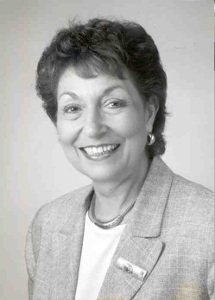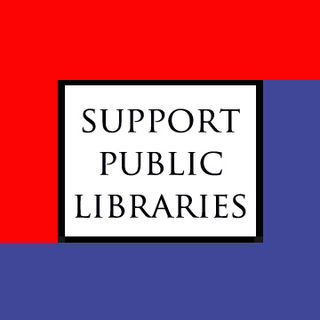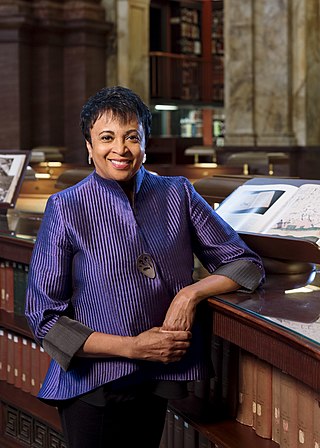Interlibrary loan is a service that enables patrons of one library to borrow physical materials and receive electronic documents that are held by another library. The service expands library patrons' access to resources beyond their local library's holdings, serving as "an integral element of collection development" for libraries.
The American Library Association (ALA) is a nonprofit organization based in the United States that promotes libraries and library education internationally. It is the oldest and largest library association in the world, with 49,727 members as of 2021.

The Linguistic Society of America (LSA) is a learned society for the field of linguistics. Founded in New York City in 1924, the LSA works to promote the scientific study of language. The society publishes three scholarly journals: Language, the open access journal Semantics and Pragmatics, and the open access journal Phonological Data & Analysis. Its annual meetings, held every winter, foster discussion amongst its members through the presentation of peer-reviewed research, as well as conducting official business of the society. Since 1928, the LSA has offered training to linguists through courses held at its biennial Linguistic Institutes held in the summer. The LSA and its 3,600 members work to raise awareness of linguistic issues with the public and contribute to policy debates on issues including bilingual education and the preservation of endangered languages.

Judith Fingeret Krug was an American librarian, freedom of speech proponent, and critic of censorship. Krug became director of the Office for Intellectual Freedom at the American Library Association in 1967. In 1969, she joined the Freedom to Read Foundation as its executive director. Krug co-founded Banned Books Week in 1982.
The Public Library Association (PLA) is a division of the American Library Association, is a professional association of public librarians and supporters dedicated to the "development and effectiveness of public library staff and public library services." In keeping with this mission, the PLA provides continuing education to members, hosts a biennial professional conference, publishes a trade journal, and advocates for public libraries and literacy. The PLA was founded in 1944 and currently has over 9,000 members.

The Library Services and Construction Act, enacted in 1964 by the U.S. Congress, provides federal assistance to libraries in the United States for the purpose of improving or implementing library services or undertaking construction projects.

The Institute of Museum and Library Services (IMLS) is an independent agency of the United States federal government established in 1996. It is the main source of federal support for libraries and museums within the United States, having the mission to "create strong libraries and museums that connect people with information and ideas." In fiscal year 2015, IMLS had a budget of $228 million. It is a sub-agency of the National Foundation on the Arts and the Humanities, along with the National Endowment for the Arts, the National Endowment for the Humanities, and the Federal Council on the Arts and the Humanities.

James G. Neal is an American librarian, library administrator, and a prominent figure in American and international library associations. In 2022 President Joe Biden appointed him to the National Museum and Library Services Board which advises the agency on general policies with respect to the duties, powers, and authority of the Institute of Museum and Library Services relating to museum, library, and information services, as well as the annual selection of National Medals recipients.
Peggy Sullivan was an American librarian and educator. She was elected president of the American Library Association and was a scholar of the history of librarianship.

Foster Edward Mohrhardt was a United States librarian. He had a long and illustrious career in library and information science as a scholar, organizer and diplomat, and was listed by American Libraries among "100 Leaders we had in the 20th Century". Mohrhardt is also known for his work to have the United States Department of Agriculture Library re-designated as a national library.

Carla Diane Hayden is an American librarian who is serving as the 14th librarian of Congress. Since the creation of the office of the librarian of Congress in 1802, Hayden is both the first African American and the first woman to hold this post. Appointed in 2016, she is the first professional librarian to hold the post since 1974.

Public library advocacy is support given to a public library for its financial and philosophical goals or needs. Most often this takes the form of monetary or material donations or campaigning to the institutions which oversee the library. Originally, library advocacy was centered on the library itself, but current trends show libraries positioning themselves to demonstrate they provide "economic value to the community."
Public libraries in the American Colonies can be traced back to 1656, when a Boston merchant named Captain Robert Keayne willed his collection of books to the town.

Carleton Bruns Joeckel, was an American librarian, advocate, scholar, decorated soldier, and co-writer, with Enoch Pratt Free Library (Baltimore) Assistant Director Amy Winslow, A National Plan for Public Library Service (1948) that provided the foundation for nationwide public library services.
Intellectual freedom encompasses the freedom to hold, receive and disseminate ideas without restriction. Viewed as an integral component of a democratic society, intellectual freedom protects an individual's right to access, explore, consider, and express ideas and information as the basis for a self-governing, well-informed citizenry. Intellectual freedom comprises the bedrock for freedoms of expression, speech, and the press and relates to freedoms of information and the right to privacy.

The University of Chicago Graduate Library School (GLS) was established in 1928 to develop a program for the graduate education of librarians with a focus on research. Housed for a time in the Joseph Regenstein Library, the GLS closed in 1989. GLS faculty were among the most prominent researchers in librarianship in the twentieth century. Alumni of the school have made a great impact on the profession including Hugh Atkinson, Susan Grey Akers, Bernard Berelson, Michèle Cloonan, El Sayed Mahmoud El Sheniti, Eliza Atkins Gleason, Frances E. Henne, Virginia Lacy Jones, Judith Krug, Lowell Martin, Miriam Matthews, Kathleen de la Peña McCook, Elizabeth Homer Morton, Benjamin E. Powell, W. Boyd Rayward, Charlemae Hill Rollins, Katherine Schipper, Ralph R. Shaw, Spencer Shaw, Peggy Sullivan, Maurice Tauber and Tsuen-hsuin Tsien.

A public library is a library that is accessible by the general public and is generally funded from public sources, such as taxes. It is operated by librarians and library paraprofessionals, who are also civil servants.

Loida Garcia-Febo is a Puerto Rican American librarian and library consultant. Garcia-Febo served on the Governing Board of the International Federation of Library Associations (IFLA) 2013-2015 and 2015-2017 and she was a member of the executive board of the American Library Association 2015-2020 serving as a board member and president. She was president of the National Association to Promote Library and Information Services to Latinos and the Spanish Speaking (REFORMA) from 2009 to 2010.

Julius C. Jefferson Jr. is an American librarian who was president of the American Library Association for the 2020-2021 term. In 2022 President Joe Biden appointed him to the National Museum and Library Services Board which advises the agency on general policies with respect to the duties, powers, and authority of the Institute of Museum and Library Services relating to museum, library, and information services, as well as the annual selection of National Medals recipients.Jefferson is additionally a section head of the Congressional Research Service at the Library of Congress, and served as the president of the Freedom to Read Foundation from 2013 to 2016.

Donna Wills Scheeder was an American librarian who was president of the International Federation of Library Associations and Institutions (IFLA) from 2015 to 2017, under the theme "Libraries: A Call to Action". Scheeder participated in the IFLA Governing Board for 6 years.














